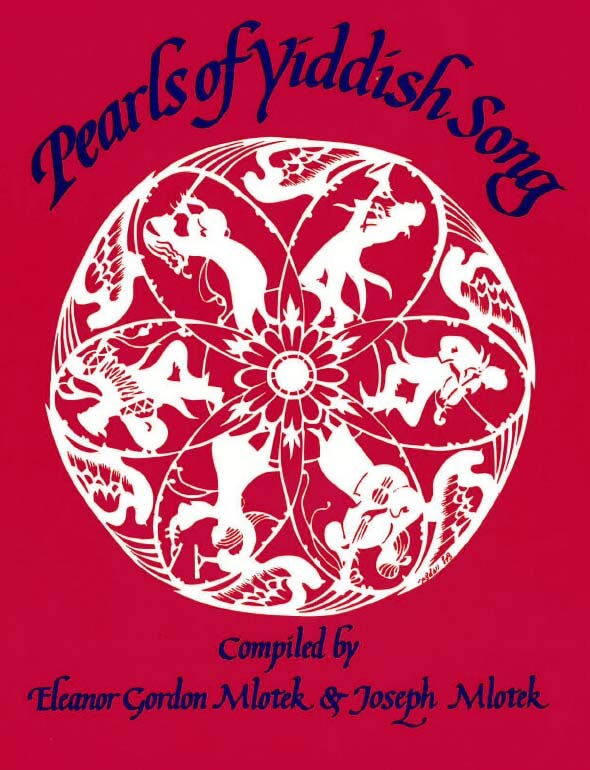Collected from Sara Rosenfeld (Montreal), who heard it in a Yiddish revue theatre in Warsaw before World War II. Variant published by E. Saculet in 1959.

How bad and how bitter it is to be someone’s servant.
How bad and how bitter and really demeaning,
it hurts you to the quick, it crushes your heart;
you laugh, and I am crying.
I am from Zhitomir,
my blood is seething within me,
it boils all week long;
My dear mother,
may my mistress
meet with disaster!
I will not let anyone lead me astray
Let them all turn against me,
I will put red nail polish on
so no one notices the horseradish stains.
Oh, Shabes after the tsholent, after the derma with cinnamon,
Yoyne-Mikhl, my dear young man, comes to me.
He kisses me and embraces me and pinches me all over,
and I sit and sing with delight.
He says he will marry me and we’ll have a wedding.
He says he will marry me, my treasure,
He’ll put on a top hat, how well it will suit him!
And my mistress will explode with rage!
Vi shlekht un vi biter s’iz tsu dinen bay yenemen,
Vi shlekht un vi biter un takish gemeyn,
Es drikt bay di leber, in hartsn a klemenish;
Ir tut dokh lakhn, un ikh nebekh veyn.
Refrain:
Ikh bin fun zhitomir,
Kokht oyf dos blit* in mir,
Kokht es a gantsene vokh;
Mayn tay’re mamenyu,
Zol di madamenyu
Krign a fintstern brokh!
Ikh vel zikh nisht lozn fun keynem
farfirenen,
Un megn dokh ale kegn mir zayn,
Kh’vel zikh lozn di negl oyf royt
manikirenen,
Men zol nisht derkenen di ratsn fun khreyn.
Oy, shabes nokhn tsholnt, nokh kishke mit tsimering
Kumt tsu mir Yoyne-Mekhl, mayn tayerer ying,
Er kusht mikh un haldzt mikh un knaypt fun mir shtiker oys,
Un ikh far groys taynig zits mir un zing.
Er zogt er vet mikh nemen un makhn a khasene,
Er zogt er vet mikh nemen, mayn tayerer shats,
Er’t onton a tsilender, vi sheyn s’vet im pasenen
Un di madamenyu vet krign di plats!
*blut
װי שלעכט און װי ביטער ס’איז צו דינען בײַ יענעמען,
װי שלעכט און װי ביטער און טאַקיש געמײן,
עס דריקט בײַ די לעבער, אין האַרצן אַ קלעמעניש;
איר טוט דאָך לאַכן, און איך נעבעך װײן.
רעפֿרײן:
איך בין פֿון זשיטאָמיר,
קאָכט אױף דאָס בליט אין מיר,
קאָכט עס אַ גאַנצענע װאָך.
מײַן טײַ’רע מאַמעניו,
זאָל די מאַדאַמעניו
קריגן אַ פֿינצטערן בראָך!
איך װעל זיך נישט לאָזן פֿון קײנעם פֿאַרפֿירענען,
און מעגן דאָך אַלע קעגן מיר זײַן,
כ’װעל זיך לאָזן די נעגל אױף רױט מאַניקירענען,
מען זאָל נישט דערקענען די ראַצן פֿון כרײן.
אױ, שבת נאָכן טשאָלנט, נאָך קישקע מיט צימערינג
קומט צו מיר יונה־מעכל, מײַן טײַערער ייִנג,
ער קושט מיך און האַלדזט מיך און קנײַפּט פֿון מיר שטיקער אױס,
און איך פֿאַר גרױס תּעניג זיץ מיר און זינג.
ער זאָגט ער װעט מיך נעמען און מאַכן אַ חתונה,
ער זאָגט ער װעט מיך נעמען, מײַן טײַערער שאַץ,
ער’ט אָנטאָן אַ צילענדער, װי שײן ס’װעט אים פּאַסענען
און די מאַדאַמעניו װעט קריגן די פּלאַץ!
Song Title: Vi Shlekht Un Vi Biter

First published in 1988 as Pearls of Yiddish Song: Favorite Folk, Art and Theatre Songs, this anthology contains 115 songs. Some material had never been published, while others, included in rare song collections or sheet music, were largely inaccessible. The songs presented reflect Jewish life in Eastern Europe and the United States and depict childhood, love, family celebrations, poverty, work and struggle. There are also songs from the Hasidic and Maskilic movements, songs of Zion and of America, as well as songs from the Yiddish theater.
The title of this anthology derives from the weekly two-page feature column “Pearls of Yiddish Poetry,” which the compilers Yosl and Chana Mlotek initiated in 1970 in the Yiddish newspaper Der Forvertz (the Yiddish Daily Forward). Hundreds of readers from around the world — including authors, composers, singers, actors — became co-participants in this collective folk project and recalled melodies, lines, fragments, stanzas and their variants of songs, poems, and plays which they had heard in their youth. At first, readers sent in only written material. Later, they also taped songs on cassettes, many of whose melodies had, until then, never been recorded. They also identified and supplied missing information regarding lyricists, poets, and composers and described the circumstances surrounding the songs’ origins, their dissemination, diffusion and impact.